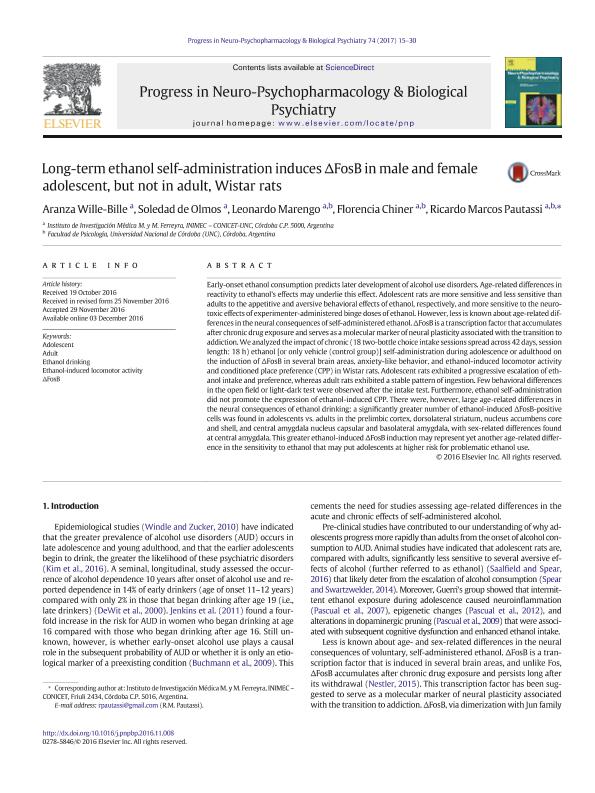Artículo
Long-term ethanol self-administration inducess ΔFosB in male and female adolescent, but not in adult, Wistar rats
Wille-bille, Aranza ; de Olmos, Soledad
; de Olmos, Soledad ; Marengo, Leonardo Gabriel
; Marengo, Leonardo Gabriel ; Chiner, Florencia; Pautassi, Ricardo Marcos
; Chiner, Florencia; Pautassi, Ricardo Marcos
 ; de Olmos, Soledad
; de Olmos, Soledad ; Marengo, Leonardo Gabriel
; Marengo, Leonardo Gabriel ; Chiner, Florencia; Pautassi, Ricardo Marcos
; Chiner, Florencia; Pautassi, Ricardo Marcos
Fecha de publicación:
06/03/2017
Editorial:
Pergamon-Elsevier Science Ltd
Revista:
Progress in Neuro-Psychopharmacology and Biological Psychiatry
ISSN:
0278-5846
Idioma:
Inglés
Tipo de recurso:
Artículo publicado
Clasificación temática:
Resumen
Early-onset ethanol consumption predicts later development of alcohol use disorders. Age-related differences in reactivity to ethanol's effects may underlie this effect. Adolescent rats are more sensitive and less sensitive than adults to the appetitive and aversive behavioral effects of ethanol, respectively, and more sensitive to the neurotoxic effects of experimenter-administered binge doses of ethanol. However, less is known about age-related differences in the neural consequences of self-administered ethanol. ΔFosB is a transcription factor that accumulates after chronic drug exposure and serves as a molecular marker of neural plasticity associated with the transition to addiction. We analyzed the impact of chronic (18 two-bottle choice intake sessions spread across 42 days, session length: 18 h) ethanol [or only vehicle (control group)] self-administration during adolescence or adulthood on the induction of ΔFosB in several brain areas, anxiety-like behavior, and ethanol-induced locomotor activity and conditioned place preference (CPP) in Wistar rats. Adolescent rats exhibited a progressive escalation of ethanol intake and preference, whereas adult rats exhibited a stable pattern of ingestion. Few behavioral differences in the open field or light-dark test were observed after the intake test. Furthermore, ethanol self-administration did not promote the expression of ethanol-induced CPP. There were, however, large age-related differences in the neural consequences of ethanol drinking: a significantly greater number of ethanol-induced ΔFosB-positive cells was found in adolescents vs. adults in the prelimbic cortex, dorsolateral striatum, nucleus accumbens core and shell, and central amygdala nucleus capsular and basolateral amygdala, with sex-related differences found at central amygdala. This greater ethanol-induced ΔFosB induction may represent yet another age-related difference in the sensitivity to ethanol that may put adolescents at higher risk for problematic ethanol use.
Palabras clave:
Adolescent
,
Adult
,
Ethanol Drinking
,
Ethanol-Induced Motor Activity
,
Delta Fosb
Archivos asociados
Licencia
Identificadores
Colecciones
Articulos(INIMEC - CONICET)
Articulos de INSTITUTO DE INV. MEDICAS MERCEDES Y MARTIN FERREYRA
Articulos de INSTITUTO DE INV. MEDICAS MERCEDES Y MARTIN FERREYRA
Citación
Wille-bille, Aranza; de Olmos, Soledad; Marengo, Leonardo Gabriel; Chiner, Florencia; Pautassi, Ricardo Marcos; Long-term ethanol self-administration inducess ΔFosB in male and female adolescent, but not in adult, Wistar rats; Pergamon-Elsevier Science Ltd; Progress in Neuro-Psychopharmacology and Biological Psychiatry; 74; 6-3-2017; 15-30
Compartir
Altmétricas



